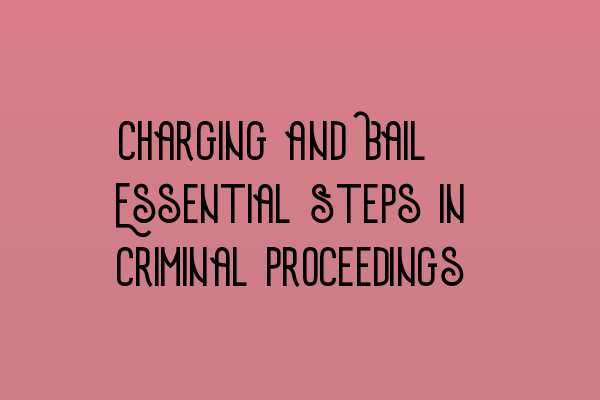Charging and Bail: Essential Steps in Criminal Proceedings
When it comes to criminal proceedings in the UK, two key steps that significantly shape the course of a case are charging and bail. Understanding the nuances of these steps is essential for both legal professionals and individuals involved in criminal cases. In this article, we will explore the crucial aspects of charging and bail, providing a comprehensive overview of their significance.
The Process of Charging
Charging is the formal process by which a person is accused of committing a crime. It is initiated by the police or law enforcement agencies and involves notifying the person of the specific offense they are alleged to have committed. This step paves the way for further legal proceedings and ensures that the accused is aware of the charges they will face.
Factors such as the severity of the offense, available evidence, and public interest play significant roles in determining whether someone should be charged. Once the decision to charge is made, the accused person will receive a Charge Sheet, outlining the details of the offense and the date of the alleged incident. It is crucial to consult legal experts to understand the charges against you or your client fully.
If you want to dive deeper into criminal practice and expand your expertise, our Workshops and Seminars on Criminal Practice: Expanding Your Expertise offer valuable insights and knowledge in this area.
The Importance of Bail
Bail refers to the temporary release of an accused person awaiting trial or sentencing. It is a fundamental aspect of criminal proceedings as it provides individuals with the opportunity to prepare their defense and maintain their personal and professional lives, albeit under certain conditions imposed by the court.
Obtaining bail is not automatic and depends on various factors, including the seriousness of the offense, the likelihood of the accused committing further crimes or tampering with evidence, and the defendant’s ties to the community. The court determines whether it is appropriate to grant bail by considering these factors carefully.
Updates in UK criminal laws can significantly impact the bail process. Stay informed and prepared by reading our Updates in UK Criminal Laws: Staying Informed and Prepared article.
If bail is granted, specific conditions may be imposed, such as surrendering passports, regular reporting to the police, or restrictions on leaving the country. These conditions are designed to mitigate any potential risks associated with granting bail and to ensure the accused fulfills their obligations to the court.
It is vital to seek legal advice to understand the bail process fully and to present a strong case for bail if you or your client are facing criminal charges.
Conclusion
Charging and bail are critical steps in criminal proceedings in the UK. The charging process officially notifies individuals of the offenses they are accused of, initiating the formal legal process. Bail, on the other hand, provides accused individuals with temporary release while awaiting trial or sentencing, allowing them to prepare their defense and maintain their personal lives under specific conditions.
For a comprehensive understanding of criminal law and practice, we recommend joining our SQE Criminal Law Study Group to enhance your knowledge and skills in this field.
If you want a detailed analysis of criminal evidence rules and how they influence criminal proceedings, read our article on Decoding Criminal Evidence Rules: A Detailed Analysis.
Lastly, we would like to emphasize the importance of ensuring the rights of victims in criminal procedures. Learn more about the legal protections and support available by checking out our article on Ensuring Rights of Victims in Criminal Procedures: Legal Protections and Support.
